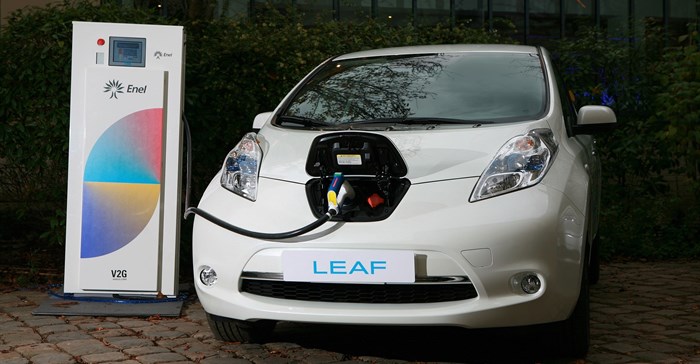
Industry projections show that by 2050 there could be twice as many cars on the road as there are today - a staggering 2.4-billion. Currently, more than half (54%) of the world's population lives in cities and by 2050, seven out of every 10 people will live in urban areas, so it is imperative that the infrastructure exists to support this growth. Delivering and managing that growth in a way that is sustainable for the world requires smart thinking.
Nissan, a pioneer of the electric vehicle with its Leaf, is also joining the charge to provide power. It has announced a series of discussions to take place in Europe on the topic under the banner of Nissan Futures. Pursuing a goal of zero-emission vehicles and zero fatalities on the road, the company's 'intelligent mobility' vision is designed to guide its product and technology pipeline, anchoring critical company decisions around how cars are powered, how they are driven, and how they integrate into society.
The event will bring together industry leaders, media, partners and stakeholders for thought-provoking discussions designed to inspire an intelligent mobility revolution.
"The creation of the Nissan Futures series was born out of Nissan's deep desire to create a safer and more sustainable future for everyone," says Paul Wilcox, chairman of Nissan Europe. "It's no longer enough for car makers to work in a silo. The challenges of tomorrow require solutions that transcend single industries or companies. That's why we're partnering with like-minded businesses from other sectors to deliver new solutions that support a more sustainable future."
One of those partnerships is with UK-based power company Enel. The two companies have announced plans to launch a major vehicle-to-grid (V2G) trial. The trial will work by installing and connecting 100 V2G units at locations agreed by private and fleet owners of the Nissan Leaf and e-NV200 electric van. By giving Nissan electric vehicle owners the ability to plug their vehicles into the V2G system, owners will have the flexibility and power to sell stored energy from their vehicle battery back to the UK's national grid.
"Smart energy management is one of the biggest challenges any nation faces for the future which is why this trial is so critical in assessing the feasibility of using variable, more flexible energy sources," says Wilcox.
"We see Nissan electric vehicles as being the mobile energy hubs of the future, pioneering a self-sustaining energy infrastructure that will help solve the capacity issues of the future."
Currently, if all 18,000 Nissan electric vehicles in the UK were connected to the energy network, the company says they would generate the equivalent output of a 180MW powerplant. If that was scaled up in a future in which all the vehicles on UK roads are electric, vehicle-to-grid technology could generate a virtual power plant of up to 370GW. This energy capacity would be enough to power the UK, Germany and France.
SA is a long way from seeing that number of electric vehicles on our roads, but as the temperatures drop attention will again turn to ways to avoid the darkness of load shedding in the long term. In this regard, SA could benefit from another partnership Nissan has announced with power management company Eaton. The two companies have created the 'xStorage' solution, which works along similar lines to Tesla's Powerwall by giving consumers the power to control how and when they use energy in their own homes.
Connected to residential power supply or renewable energy sources such as solar panels, the unit can charge up when renewable energy is available or energy is cheaper (during the night) and release that stored energy when demand and costs are high. If a home is equipped with solar technology, this means consumers can power their homes using clean energy stored in their xStorage system. The system also provides a backup solution, ensuring the lights never go out. In Europe, customers can generate additional revenue by selling stored energy back to the grid when demand and costs are high.
Nissan has partnered with architects Foster and Partners to reveal their vision of the fuel station of the future. That vision is about connected power solutions based in your home. Essentially the plan is for the fuel station of the future to be the car itself. The vision hints at how vehicle-to-grid, battery storage, wireless charging, autonomous drive technology and over-the-air connectivity could combine to revolutionise how energy is used and distributed across major cities.
"Integrating zero-emission technologies into the built environment is vital in creating smarter, more sustainable cities," says David Nelson, of Foster and Partners. "That commitment must extend far beyond the car - it must sit at the heart of everything we do."
Source: Business Day

For more than two decades, I-Net Bridge has been one of South Africa’s preferred electronic providers of innovative solutions, data of the highest calibre, reliable platforms and excellent supporting systems. Our products include workstations, web applications and data feeds packaged with in-depth news and powerful analytical tools empowering clients to make meaningful decisions.
We pride ourselves on our wide variety of in-house skills, encompassing multiple platforms and applications. These skills enable us to not only function as a first class facility, but also design, implement and support all our client needs at a level that confirms I-Net Bridge a leader in its field.
Go to: http://www.inet.co.za